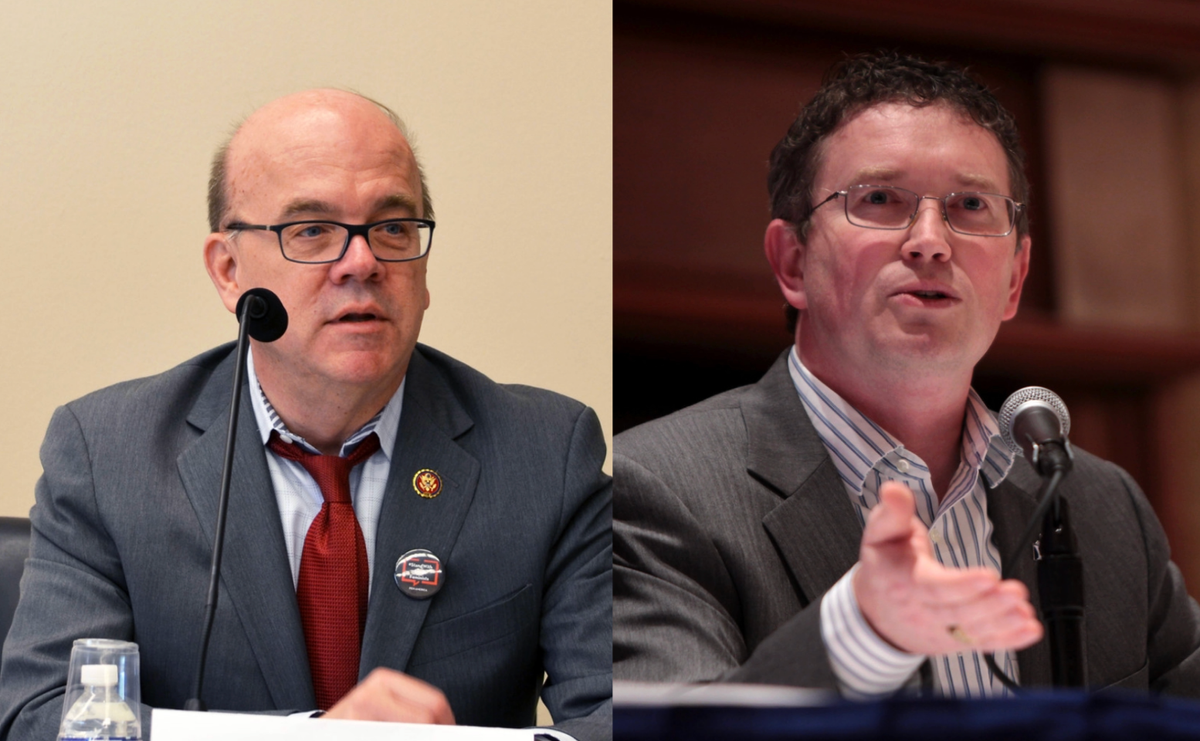Bipartisan Group Of Congress Members To Biden: Don't Extradite Assange
The letter represents the largest congressional effort to date raising concerns with the ongoing prosecution of Assange.

Sixteen members of the United States Congress sent a letter to President Joe Biden encouraging his administration to "withdraw the U.S. extradition request currently pending against Australian publisher Julian Assange and halt all prosecutorial proceedings against him as soon as possible."
The letter was initiated by Rep. Jim McGovern, D-Mass., and Rep. Thomas Massie, R-Ky. It marks the second time this year members of Congress have signed a joint letter to the Biden administration urging them to end the prosecution of Assange on press freedom grounds. As the first bipartisan and bicameral letter, it represents the largest congressional effort to date raising concerns with the ongoing prosecution of Assange.
The following members of Congress also signed the letter: Rep. Rashida Tlaib, D-Mich., Rep. Eric Burlison, R-Mo., Rep. Ilhan Omar, D-Minn., Rep. Paul Gosar, R-Ariz., Rep. Ayanna Pressley, D-Mass., Rep. Marjorie Taylor Greene, R-Ga., Rep. Pramila Jayapal, D-Wash., Rep. Matt Rosendale, R-Mont., Rep. Greg Casar, D-Texas, Rep. Cori Bush, D-Mo., Rep. Jamaal Bowman, D-N.Y., Rep. Jesús “Chuy” García, D-Ill., Rep. Alexandria Ocasio-Cortez, D-N.Y., and Sen. Rand Paul, R-Ky.
The letter’s signatories were largely drawn from the Congressional Progressive Caucus and the libertarian or “MAGA” (supporters for former President Trump) wing of the Republican Party.
Although such a coalition may defy conventional political wisdom, similar coalitions between congressional progressive and libertarians have emerged in recent memory up around efforts to rein in the surveillance state or reassert Congress’s war powers.
On April 11, 2023, the anniversary of Assange’s arrest and expulsion from the Ecuadorian embassy in London, seven Democrats sent a letter to Attorney General Merrick Garland. The letter was initiated by Tlaib, who tweeted, “Four years ago today, Julian Assange was arrested for publishing the truth.”
All of the seven signatories were from an informal grouping within the left-wing of the Congressional Progressive Caucus often referred to as the Squad. (Every signatory of Tlaib's letter signed the McGovern-Massie letter.)
Additionally, following an October oversight hearing with Garland that was held by the House Judiciary Committee, Bush sent a follow-up letter. In addition to asking questions around mass incarceration, the death penalty, and the treatment of "Stop Cop City" protesters, Bush raised the matter of Assange’s extradition.
Assange is currently detained in Belmarsh high-security prison in London, as the U.S. seeks to extradite him for a trial on Espionage Act charges. Each of the charges against Assange stem from his role as WikiLeaks editor-in-chief.
In 2010 and 2011, the media organization published classified information about the U.S. government's wars in Iraq and Afghanistan, the military prison at Guantanamo Bay, Cuba, and the backroom dealings of the State Department.
While U.S. Army whistleblower Chelsea Manning, the source of the documents, was one of a number of whistleblowers charged under the Espionage Act under President Barack Obama, the Assange indictment issued under President Donald Trump marked the first time that a publisher was charged under the Espionage Act.
In spite of the Obama administration’s unprecedented use of the Espionage Act to silence journalists’ sources and whistleblowers and its open antipathy for Assange and WikiLeaks, the Obama administration balked at the prospects of formally indicting Assange under the Espionage Act. They feared the wide ranging ramifications for press freedom of a successful prosecution of Assange under the Espionage Act.
The Trump administration, guided by Attorney General Jeff Sessions and CIA Director Mike Pompeo, reversed course. Both officials escalated U.S. security agencies' extralegal activities against Assange and brought the unprecedented indictment.
"We believe the Department of Justice acted correctly in 2013, during your vice-presidency, when it declined to pursue charges against Mr. Assange for publishing the classified documents because it recognized that the prosecution would set a dangerous precedent," the McGovern-Massie letter to Biden states. "We note that the 1917 Espionage Act was ostensibly intended to punish and imprison government employees and contractors for providing or selling state secrets to enemy governments, not to punish journalists and whistleblowers for attempting to inform the public about serious issues that some U.S. government officials might prefer to keep secret."
It continues, "We are aware that the Assange case has been cited by officials of the People’s Republic of China to claim that the U.S. is 'hypocritical' when it comes to its purported support for media freedom. We are also well aware that should the U.S. extradition and prosecution go forward, there is a significant risk that our bilateral relationship with Australia will be badly damaged."
While the Biden administration has made press freedom a key rhetorical commitment and sought to distance itself from Trump’s attacks on democracy, officials have barreled along with the prosecution. One recent report indicated that the FBI has tried to convince journalists to testify against Assange during a U.S. trial.
Progressives and libertarians in Congress are not the only individuals to sound the alarm. Major newspapers, including The New York Times, The Guardian, Le Monde, Der Spiegel, and El Pais, have criticized the prosecution. Civil liberties, human rights, and press freedom organizations, such as the American Civil Liberties Union, Amnesty International, Committee for the Protection of Journalists, Defending Rights & Dissent, Freedom of the Press Foundation, and Reporters Without Borders, have repeatedly called for the charges to be dropped.
The Assange prosecution has developed into a source of diplomatic tension for the Biden administration. Most significant is the widespread opposition to his extradition in Australia.
Prime Minister Anthony Albanese and officials in his government have repeatedly raised the issue, including during a recent visit to Washington, D.C. In September, a cross-party delegation from the Australian Parliament visited the U.S. and met with staff from many of the representatives' offices that would go on to sign the McGovern-Massie letter.
So far, the Biden administration has been unmoved by members of Congress. But with increasing opposition from key international allies, mainstream newspapers and press freedom groups, as well as parts of the progressive coalition that he must depend on for reelection, it is unclear if Biden can continue to carry on with business as usual without facing some kind of consequence.




Comments ()